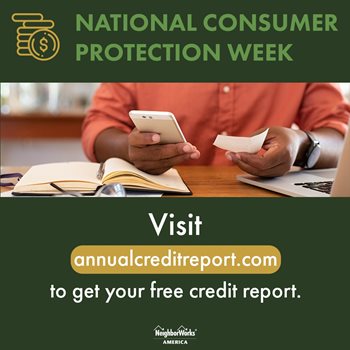National Consumer Protection Week is a time to examine consumer protection issues, to bring awareness to potential scams and pitfalls and to remind individuals of their consumer rights. Across the country, nonprofits, including a number of NeighborWorks America network organizations, do this work every day through outreach and counseling.
"Taking time to spotlight this work is always helpful," shares Erin Scheithe, content specialist at the Consumer Financial Protection Bureau's Office for Older Americans."It's a good opportunity to get the word out about scams and frauds and the way consumers can empower each other – and empower themselves – to protect their assets, money and identity. We take any observance as a good time to think about how consumers can protect themselves from these dangers."
Laura Ospina Jaramillo, financial capability manager at NeighborWorks America, agrees."A lot of consumers reach out for help when they find something isn't working for them. But wouldn't it be wonderful to have a time before that happens to remind you to check: Is everything okay?"
Scams continue to be on the rise, Scheithe says. Early in the pandemic, it was home scams and scams related to vaccines. More recently,"romance scammers" have preyed on people who have been isolated. The Federal Trade Commission reports that individuals sent $547 million to online romance scammers last year. Her agency advises consumers to remain vigilant and to watch for red flags.
As Consumer Protection Week wraps up, the need for awareness remains. Scheithe and Ospina Jaramillo offered these tips to help consumers stay safe:
- Talk with financial and housing counselors. Spread across the country with nearly 250 network organizations in every state and in Washington, D.C. and Puerto Rico, many
 NeighborWorks network organizations have counselors who can help clients navigate finances, budgets, housing and more. More than 160 NeighborWorks organizations have HUD-certified housing counselors on staff.
NeighborWorks network organizations have counselors who can help clients navigate finances, budgets, housing and more. More than 160 NeighborWorks organizations have HUD-certified housing counselors on staff. - Examine your credit reports. When you are planning to buy a new car or home, there's a lot of paperwork. Make sure your credit is in good standing and scan your reports, available every 12 months from the three reporting agencies, for things that might not make sense. Work in conjunction with a counselor from a NeighborWorks network organization, and visit annualcreditreport.com for more. If there is incorrect information or a need to make a plan around your debt, a financial coach can help you investigate, dispute, or create a plan to improve your credit scores.
- Watch for scams. NeighborWorks America's Stop Home Scams initiative points out even more potential red flags. Remember: If something looks too good to be true, it probably is. Scheithe also suggests asking a friend or family member if something feels a little bit off."Two heads are better than one when it comes to scams," she says.
- Take your time when someone asks for a donation or says you owe them money. And if someone asks you to pay for a repair with a gift card, recognize that as another red flag.
- Get your taxes in order. In 2021, 35 NeighborWorks networks organizations offered tax preparation services through the free Volunteer Income Tax Assistance program or their own programming. Ospina Jaramillo recommends filing early and arranging for direct deposit for potential refunds."When you're thinking of buying a home, the first thing they'll ask for is three years of your taxes," she says.

